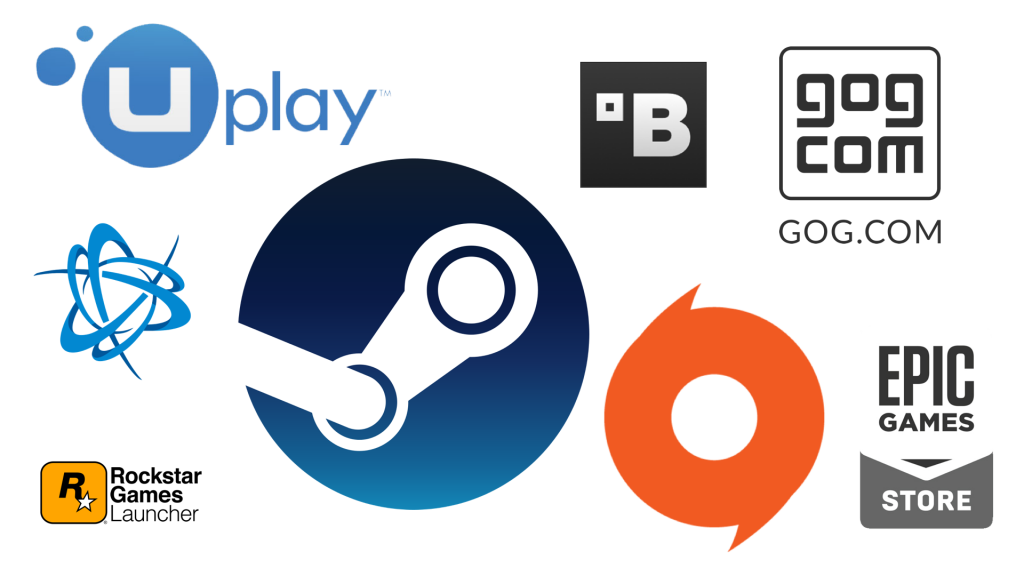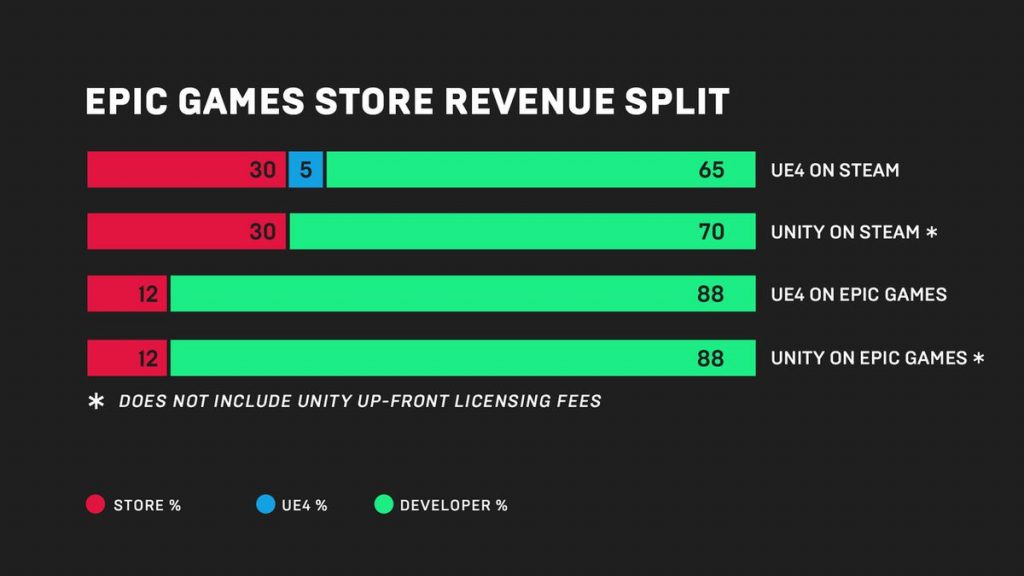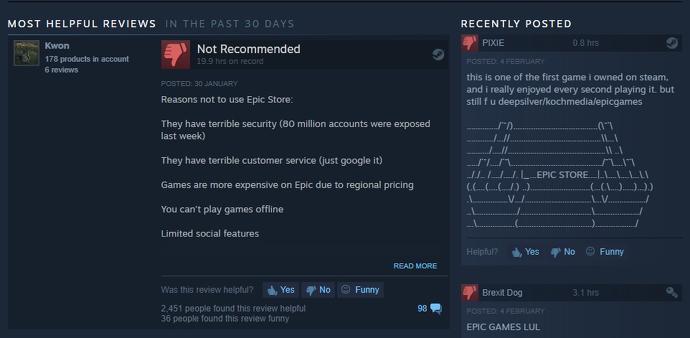Epic Games Store’s struggle to become a platform

Epic Games finally found a way to invest the 4 billion dollars of Fortnite revenue: they are opening their store to compete with the largest PC gaming platform – Steam.
Steam, originally envisioned as a tool for automatic update Valve Corporation’s games, has become the biggest online store for PC games. Its dominance lasted for more than a decade, despite many companies trying to battle it with their own launchers and stores.
It seems, however, that the balance in the PC gaming industry is soon to be disturbed. Finally, a new foe with the potential to compete with Valve has appeared, and its name is Epic Games. In December of 2019 the company introduced its own Epic Games Store and it aims to turn it into a full-fledged platform (Bailey).
Not all launchers are platforms

Of course, many large publishers have tried to compete with Valve to create the default platform for PC gaming. However, many of them failed to become something more than just the publisher’s dedicated game launcher. The most prominent examples are EA’s Origin and Ubisoft’s Uplay.
In 2011 EA announced that its largest title of the year, Battlefield 3, would only be published in the company’s new digital store, Origin. Since then, every first-party game EA published on PC is exclusive to the company’s distribution service. Ubisoft is not as confident in their Uplay: while it has almost the same functionality as Origin and serves as the publisher’s digital storefront, all company’s PC titles are still available in other stores.
While both of these distribution services could be nominally called ‘platforms’, as they distribute interfaces and users, and both add value to what is brought into them and generate value from it (Bratton 41-42), they lack the Steam’s scope and, more importantly, programmability (Bogost and Montfort).

Yes, both Ubisoft and EA let few carefully selected indie developers sell their games in their stores, but Steam, in contrast, allows to publish literally any game if it is not ‘illegal or straight up trolling’ (Webster), and also serves a place to share game modifications or other user-generated in-game content, such as weapon skins in CS:GO. And yes, they let you use an avatar of your choice, and Uplay even provides a (highly curated) forum, however they fall short in comparison with Steam’s profile customization, user-reviews system, and its features to share opinions and experiences among users.
Today more and more publishers enter the market of digital videogame platforms, with companies such as CD Project Red, Activision-Blizzard, Bethesda and even Rockstar introducing their own launchers with digital store capabilities. Yet, to reach the level of Steam’s ‘infrastructuralization’ (Plantin et al. 295), they would need to bring more types of users to their services as well as to significantly expand their set of affordances. Epic Games, however, has a different stand on that matter.
Epic fight for user-base
Epic Game’s Fortnite is a major success. Since its release in 2017 this free-to-play battle royal game already earned its publisher almost 4 billion dollars (Tassi) and Epic is not hesitant to put large chunk of this revenue to use (Statt). In order to drive a large audience to EGS, Epic employs three tactics: giving developers a bigger cut, signing exclusivity deals for large titles and giving away games for free.
When Epic launched its store it announced that it would go away from the industry standard revenue cut of 30 percent, taking only 12 instead. The company also offered to waive the 5 percent royalty fee for games that are built on Unreal Engine when selling through their store. The aim of this generous offer is, of course, to drive more game developers to the service, which would in turn bring more end-users.

However, Epic understood that simply offering the same titles as Steam wouldn’t be sufficient make users switch from Steam. That’s why the company decided to employ a tactic well-established in console gaming industry – exclusivity deals. At the moment, the list of Epic Store exclusives consists of seven games from different publishers and will probably continue to expand in the near future. The most controversial games on the list are Gearbox’s Borderlands 3 and Deep Silver’s Metro Exodus as their fans were dissatisfied with the publishers’ decision, arguing that previous instalments of both series were not locked to any specific platforms.
Epic Games’ last tactic of giving out games for free also comes from the console industry, but on even more generous terms. While three major console developers, Sony, Nintendo and Microsoft are using free games to promote their paid subscription services, Epic’s offered games are literally free and accessible to all EGS users.

These tactics articulate that Epic doesn’t want to spend the time and effort to win users from steam. Instead, the company is eager to use profits from selling V-bucks to buy up developers and to buy off unsatisfied customers with free games.
Un-epic consequences
In the era of ‘Web as a platform’ (O’Reilly), gaming means much more than the core game experience. PC gamers today want to share and discuss their experiences, give feedback to developers, find new friends, and troubleshoot problems they stumble upon while playing. And they expect their platform affords them to do all that. Epic exclusivity deals bring dismay to users because they are being forcefully locked in a platform with very little features. According to the official roadmap posted on Trello, at the time of writing EGS still doesn’t have a shopping cart (Statt). In order to show their protest, Steam users have adopted two peculiar practices.
The first practice called review bombing is related to Deep Silver’s surprising removal of Metro: Exodus from Steam. In two days after the announcement steam users posted over 3,000 negative reviews to the store pages of Metro: 2033 and Metro: Last Light – the previous games in the series. Review bombing, or, in other words, user practice of posting a large number of reviews in a compressed time frame, aimed at lowering the Review Score of a game, was already acknowledged by Valve in 2017. However, it was only after the review bombing of Metro and Borderlands franchises that Valve has actually changed its algorithms to ignore such ‘off-topic reviews’. That was an important step to take if you consider that, as all platforms, Steam used to imitate a position of a neutral facilitator that had no agency over the user interactions (Gillespie 358).

Another practice also originates from the EGS’s lack of features. Borderlands 3 players have decided to use Steam forums of the game’s predecessor, Borderlands 2, as a place to troubleshoot their performance issues. What’s interesting is that such witty usage was not coordinated whatsoever: the users just did what they would normally do – go to Steam Discussions. And even after the attempts to redirect discussions to the game’s official sub-reddit and Gearbox forums, people still continue to post on Steam.
Conclusion
Epic is set to turn its launcher with digital store capabilities into an actual PC gaming platform, and is comfortable with spending more and earning less than Valve in order to fast-forward the building of its user-base. It is important, however, to critically reflect on the methods in use. The tactics discussed above shows that Epic’s pursue of developers and end-users puts both categories at disadvantage: the former receive public criticism and the latter receive worse gaming experience.
The publisher has to consider for how long will its strategy of giving customers money to tolerate such negligence will endure, and what it actually takes to become a platform.
Bibliography
Bailey, Jason M. “Fortnite Maker Wants to Sell More Games, and Build a Platform to Do It.” The New York Times, 27 Aug. 2019. NYTimes.com, https://www.nytimes.com/2019/08/27/business/steam-epic-games-store.html.
Bogost, Ian and Montfort, Nick. ‘‘Platform studies: frequently questioned answers.’’ Presented at the after media—embodiment and context digital arts and culture 2009, Arts Computation Engineering, University of California, Irvine, CA, 2009. http://escholarship.org/uc/item/01r0k9br.
Bratton, Benjamin H. The Stack: On Software and Sovereignty. The MIT Press, 2016. DOI.org (Crossref), doi:10.7551/mitpress/9780262029575.001.0001.
Gillespie, Tarleton. The politics of ‘platforms.’ New Media & Society, vol. 12, no. 3, 2010, 347–364. https://doi.org/10.1177/1461444809342738.
O’Reilly, Tim. ‘‘What Is Web 2.0.’’ O’Reilly, 30 Sept. 2005, https://www.oreilly.com/pub/a/web2/archive/what-is-web-20.html.
Plantin, Jean-Christophe, et al. “Infrastructure Studies Meet Platform Studies in the Age of Google and Facebook.” New Media & Society, vol. 20, no. 1, Jan. 2018, pp. 293–310. DOI.org (Crossref), doi:10.1177/1461444816661553.
Statt, Nick. “Epic vs. Steam: The Console War Reimagined on the PC.” The Verge, 16 Apr. 2019, https://www.theverge.com/2019/4/16/18334865/epic-games-store-versus-steam-valve-pc-gaming-console-war-reimagined.
Tassi, Paul. ‘‘’Fortnite’ Revenues Fall Almost 40% From Last Year, But It’s Still A Cash Cow.’’ Forbes, 22 Jun. 2019, https://www.forbes.com/sites/paultassi/2019/06/22/fortnite-revenues-fall-almost-40-from-last-year-but-its-still-a-cash-cow/#390747ac75b6.
Webster, Andrew. “Valve Says It Will Allow ‘Everything’ on Steam as Long as It Isn’t Illegal or ‘Trolling.’” The Verge, 6 June 2018, https://www.theverge.com/2018/6/6/17435244/valve-steam-game-release-new-policy.